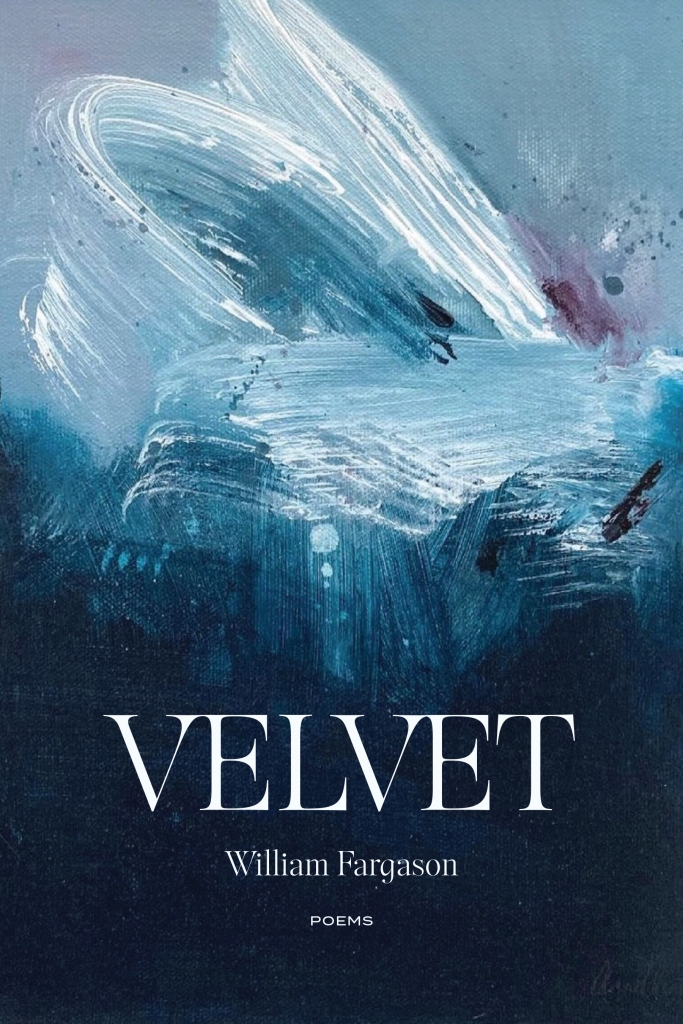Cover painting by Arielle Austin.
An exposed and exposing collection of poetry on inherited trauma, chronic illness, and the American South
Velvet, the second full-length collection from award-winning poet William Fargason, explores chronic illness, patriarchal abuse, intergenerational trauma, and racial inequality in the American South. Its speaker moves through the generations that preceded him to understand himself, and to heal from traumas both inherited and lived. As part of that heritage, the speaker confronts a family history of participation in racist ideologies and organizations to make sense of his own place within, and responsibility to, this history. In the titular lyric essay, “Velvet,” Fargason braids scientific research and YouTube videos in an attempt to forge paths for healing while contending with an inherited chronic disease. Ultimately, Velvet argues against traditional forms of toxic masculinity and suggests that vulnerability, soft and bleeding as the velvet on a deer’s antlers, offers one solution to it.
FORTHCOMING MAY 15, 2024.
Preorder at Northwestern University Press
Advance Praise
“William Fargason’s poems glimmer with grit and tenderness. Largely focused on the speaker’s relationship with his father, Velvet not only reckons with the violence we’ve inherited; these poems imagine how we might emerge from the ashes of the past, to start again, to have a voice, despite the abuses of toxic masculinity and the struggles of mental and physical illness. With lyrical mastery, rich narratives, and heightened vulnerability, Velvet is an intense and moving second collection.” —Marianne Chan, author of All Heathens
“In Velvet, Will Fargason masterfully writes toward and away from the intergenerational trauma the speaker of these poems is so familiar with—trauma carried in the body. The writing is sensory, musical, and full of a profound longing that avoids sentimentality or cliché. Fargason offers us a tender, self-reflective, vulnerable, and nuanced exploration of masculinity—critical and at once aware of its pervasive aspects at the personal and cultural levels.” —Julia Kolchinsky Dasbach, author of 40 Weeks
Cover image by Devin Lunsford.
In his debut collection, William Fargason inspects the pain of memory alongside the pain of the physical body. Fargason takes language to its limits to demonstrate how grief is given a voice. His speaker confronts illness, grapples with grief, and heals after loss in its most crushing forms. These poems attempt to make sense of trauma in a time of belligerent fathers and unacceptable answers. Fargason necessarily confronts toxic masculinity while navigating spiritual and emotional vulnerability.
Order from the University of Iowa Press
“Every sense engaged, each filament of intellect glowing, memory fully aflame—it’s not easy to survive such aliveness. So implies poet Fargason in this Love Song. Heights of awareness and passion and fullness are met by counterparts in depths of doubt and despair, of a past that ground down, that haunt writer and reader. This is a book of darkness and hope, of vision and rage. Reading Love Song to the Demon-Possessed Pigs of Gadara made me feel that I am not alone in the grief and fear of this world—I am part of it and it a part of me, but that also one (I, we, the poet, the reader) is integrally part of something larger: the project of life as something utterly worth living as deeply as possible, paths and pasts and pigs and pain and all.”—Brenda Shaughnessy, judge, Iowa Poetry Prize
“In Will Fargason’s first book, Love Song to the Demon-Possessed Pigs of Gadara, accelerating phrasal momentum and sharp figurative detail merge to put us in the prison made by child abuse and chronic pain. The narrow confines of such experience, its isolating effect, remind me of Elaine Scarry’s descriptions of torture. Fargason’s enactments of what’s happening to him and what has happened warp perception, as when he sees a lake as ‘a window I want to roll down.’ But he can’t. He’s trapped. Entrances and exits are repeatedly inverted, mirrors mirroring mirrors. The speed of the poems and their disarmingly sudden stops keep us off-guard, push us past what we think we know. About anything—pain, death, fear, anger. These poems wake their readers up. What else is poetry for?”—Elizabeth Arnold, author, Skeleton Coast
Excerpt From “Love Song to the Demon-Possessed Pigs of Gadara”:
The silence just before and just after,
and the black eyes as you leapt— “
no protest, no acceptance either.
You ran almost in unison,
a dance without music,
a curtain call,
and the crowd standing knowing this is what happens
once we find beauty:
we must watch it leave.

